Self-Publishing, Part Whatever
While I was at the Durand Fantasy Expo on Saturday, I ended up talking to several other authors and publishing folks about self-publishing and print-on-demand. Here are a few of my thoughts from the drive home.
1. Dear self-published authors: As a writer, I am not your target audience. I can’t count the number of times authors, mostly (but not always) self-published or PoD, have tried to hard-sell their books to me. Just don’t.
2. Self-publishing seems to work pretty well for comics and graphic novels. This is something I’ve noticed over the past year or two. Maybe it’s just me, but a lot of the self-pubbed/PoD comics I’ve seen are just plain good. A while back, Jane Irwin gave me copies of Vogelein: Clockwork Faerie and Vogelein: Old Ghosts. They were well-done, and I enjoyed the stories.


A lot of web comics seem to go the same route, using small PoD printers or self-publishing, and producing very nice products. It makes me wonder what we on the prose side of things could learn from the comics folks.
3. Self-publishing takes a lot of time and work. My very first book, a mainstream novel called Goldfish Dreams, recently reached the end of its contract with Fictionwise. I’d really like to put the book out there on Kindle and maybe in a few other places. Thus far, I’ve done absolutely nothing on this project. I only have so many hours, and I also have to write my next book. It makes me wonder — if I was fully responsible for the entire publication process, how much longer would it take to release each new book?
4. People will believe anything that protects their egos. “New York editors don’t want good stories, and won’t take new authors. You’re better off without an editor, because they’ll destroy your unique vision. Self-publishing is better, because publishers only pay 6-12% royalties.”
There are times when self-publishing can work. However, many of these claims are total crap … but they’re crap that protect the ego, and thus people choose to believe and defend ’em.
5. I’m outnumbered. There were a handful of other authors there on Saturday. As far as I know, I was the only “traditionally” published one there. A lot of people kept checking out my books and saying things like, “So I have to go to your web site to get these, right?” Um … sure, you can go through my web site. Or you can walk into most any bookstore in the country and pluck one of my books off the shelves.
I don’t know what to think about this. I know the technology has gotten better and more available, and this is going to mean a lot more authors taking advantage of that technology. But it was an odd feeling.
#
Please note that I’m not bashing self-publishing. As I said in #3, I’m planning to use it myself.
Anyway, questions and comments and discussion are welcome, as always.






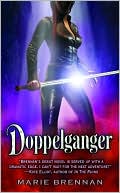 The first book I sold was the second book I wrote. It was pure chance that I didn’t write it first; the ideas for both came to me around the same time, in my senior year of high school. I could tell, even then, that both were different from the ideas I’d had before; they were richer, more substantial — worth finishing. Yeah, “finish what you started” wasn’t a skill I was terribly good at in those days; I had lots of fragments of novels lying around, but nothing that amounted to more than scattered scenes. Not until these two ideas happened along.
The first book I sold was the second book I wrote. It was pure chance that I didn’t write it first; the ideas for both came to me around the same time, in my senior year of high school. I could tell, even then, that both were different from the ideas I’d had before; they were richer, more substantial — worth finishing. Yeah, “finish what you started” wasn’t a skill I was terribly good at in those days; I had lots of fragments of novels lying around, but nothing that amounted to more than scattered scenes. Not until these two ideas happened along.

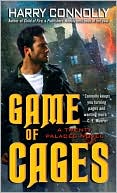
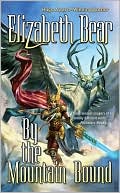
 I spent nearly ten years writing what ultimately became my first two fantasy novels, Luck in the Shadows
I spent nearly ten years writing what ultimately became my first two fantasy novels, Luck in the Shadows 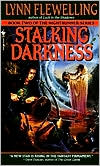 I took that path, but it gradually bled into the idea that I was putting an awful lot of effort into the Thing and maybe I should have higher aspirations. Somewhere along the way I took a week-long writing workshop with an author whose work I really admired, and she liked my proto-manuscript very much. She wasn’t a fantasy author, and didn’t have the right connections to sell it, but her faith in my work made a huge difference.
I took that path, but it gradually bled into the idea that I was putting an awful lot of effort into the Thing and maybe I should have higher aspirations. Somewhere along the way I took a week-long writing workshop with an author whose work I really admired, and she liked my proto-manuscript very much. She wasn’t a fantasy author, and didn’t have the right connections to sell it, but her faith in my work made a huge difference.
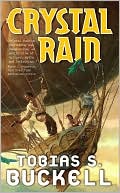 I spent a good chunk of 2002 writing the first draft of the first novel I’d ever attempted: Crystal Rain
I spent a good chunk of 2002 writing the first draft of the first novel I’d ever attempted: Crystal Rain